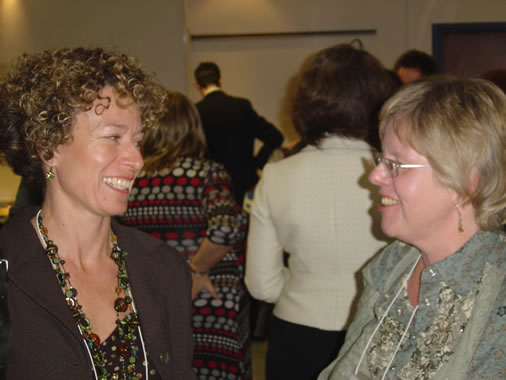|
MORE DETAILS
|
EVENING BRIEFING 13 NOV 2007 - OXFORD
|
This event looking at the new Codes of Practice just issued by the European Federation of Pharmaceutical Industries and Associations (EFPIA) was led by Joan Barnard, Medical Consultant and acknowledged expert in the pharmacutical industry codes of practice.
The following summary was kindly prepared by Ruth Bentley of Acumen Healthcare Communications.
EFPIA Codes of Practice cover over 30 European national pharmaceutical industry associations as well as individual companies involved in the manufacture of pharmaceutical products. Each country draws up its own guidelines, in keeping with EFPIA recommendations, encourages adherence and deals with local complaints. In the UK, for example, the ABPI Code of Practice is administered by the Prescription Medicines Code of Practice Authority (PMCPA).
The EFPIA Code was significantly revised in 2004, with recommendations resulting in the January 2006 ABPI Code revisions here in the UK. The current changes must be implemented from July 2008 by all members. In the UK, the updated ABPI Code is likely to be finalised next April, and take full effect from 1 July.
The key changes are contained in the:
EFPIA Code on the promotion of prescription-only medicines to, and interactions with, healthcare professionals
EFPIA Code of Practice on relationships between the pharmaceutical industry and patient organisations
The essence of all the revisions – in parallel with the recent changes to publication practice – is transparency.
Promotion of medicines and interactions with healthcare professionals
This code will apply to non-promotional activities such as non-interventional studies, consultancies, donations and grants, and meetings.
Meetings include advisory boards, visits to research and manufacturing facilities, and planning, training or investigator meetings for clinical studies. Venues should be appropriate, conducive to the main purpose of the gathering, not renowned for entertainment facilities and not extravagant. Activities and materials relating to international meetings should comply with the national code of the organising company and the national code of the venue. In addition, any arrangements made on behalf of an individual attendee should comply with the national code of that attendee. (This sometimes results in delegates from different countries having to stay in different hotels!)
Gifts include promotional gifts, donations and grants, sponsorship, and fees for service. Inducements are not permitted: No gift, pecuniary advantage or benefit in kind may be supplied, offered or promised to a healthcare professional as an inducement to recommend, prescribe, purchase, supply, sell or administer a medicinal product. Promotional gifts should be inexpensive (not more than £6 in the UK), relevant to practice, and not of personal benefit. Donations and grants are acceptable only if they are given to healthcare organisations (not individuals) to support healthcare or research. All transactions should be documented and full records kept (and, ideally, made public). Sponsorship of individuals is acceptable only in relation to meeting attendance, and the criteria for selection of sponsorship recipients are important.
Fees for service may be paid only to support healthcare or research – not as an inducement. A contract or written agreement must be drawn up for all consultancies; these include speakers, Chairs, clinical study investigators, trainers and advisory board members. There must be a ‘legitimate need’ for the service, and the contract should specify what is to be provided and the basis for payment. Thus, it is not acceptable to convene an Advisory Board without a specific ‘legitimate need’, and the selection of advisors must be based on that need, decided by someone with appropriate expertise (e.g. a member of the medical or research group rather than a marketer), and the number of consultants should be in proportion to the identified need. A clear record should be kept of the service provided, the output from the meeting and how it has subsequently been used (or not used).
Relationships with patient organisations
The principles underlying these revisions are: the independence of the organisations must be assured; partnerships are based on mutual respect; promotion is not permissible; support should be declared and transparent; funding should where possible be broad (from more than one donor). A written agreement should outline the amount and purpose of the funding and other relevant details, including the nature of any indirect, non-financial support. EFPIA provides a template to facilitate these agreements.
Additional points of interest concern the use of logos (only with written permission), editorial control of content (factual inaccuracies can be corrected, but there must be no influence favourable to commercial interests), and transparency concerning support (to be made public and always acknowledged clearly from the outset).
To make sure you're included in announcements about future events just email Peter Llewellyn, if you haven't already done so, to register your interest.

|
|
|

